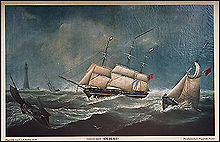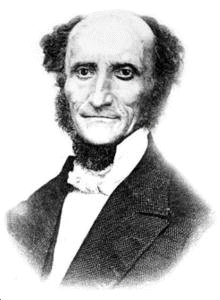Saxon Lutheran immigration of 1838–39
[3] A confessional Lutheran pastor, Martin Stephan, who originally hailed from Moravia, grew more and more opposed to the new teaching and practices.
In order to practice their faith freely according to the Book of Concord, Stephan, in 1830, prepared to emigrate to North America.
[4] Stephan grew increasingly impatient with the development of the state church, and he was subsequently arrested at various times in Saxony for holding secret conventicles and was accused of immoral conduct.
These ships were named Copernicus, Johann Georg, Republik, Olbers, and Amalia, the last and smallest, which was lost at sea and never heard of again.
The group on the remaining four ships, totaling 602 people, arrived in New Orleans in January 1839,[6][7] and from there arranged for transport on steamboat up the Mississippi River to St. Louis, Missouri.
The group reached St. Louis and spent only six weeks in that city before departing for their permanent home some 100 miles (160 km) south in Perry County, Missouri.
[8] The main body of the immigrants passed up better land near St. Louis in favor of the location in Perry County where the hilly topography was reminiscent of their homeland.
The Perry County settlers suffered from poverty and their situation was only made worse by financial mismanagement and poorly ordered priorities.
[9] Despite the hardship and tribulations, the Saxons managed to establish seven small settlements which they named after the communities that they had left behind in Germany, among them Altenburg, Dresden, Frohna, Johannisberg, Paitzdorf, Seelitz, and Wittenberg.
Classes in 1839 included six languages, math, physics, history, geography, philosophy, religion, music, and drawing.
In addition to enduring the physical and economic circumstances, the colony's situation was further complicated by the spiritual chaos brought on by the rejection of Stephan.
With his voluptuous living and dictatorial conduct, Stephan not only became brusque and capricious in his handling of people, but he was also accused of sexual misconduct and of mismanaging group funds to satisfy his expensive tastes.
A collective sense of guilt descended on the colony concerning the justifiability of the migration, the correctness or error in Stephanism, the nature of the church and ministry.
In 2014, 247 residents of the county continued to speak a distinct Upper Saxon dialect of German, although that number is decreasing, with the youngest speakers being over 50 years of age.



